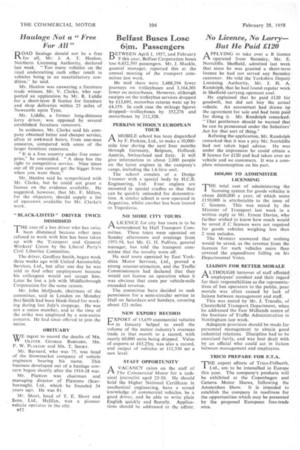No Licence, No Lorry— But He Paid £120
Page 46

If you've noticed an error in this article please click here to report it so we can fix it.
APPLYING to take over a B licence operated from Barnsley, Mr. E. Nortcliffe. Sheffield, admitted last week that since he was granted a short-term licence he had not served any Barnsley customer. He told the Yorkshire Deputy Licensing Authority, Mr. J. H. A. Randolph, that he had found regular work in Sheffield carrying opencast coal.
• He explained that he paid £120 for goodwill, but did not buy the actual vehicle. An accountant had drawn up the agreement for sale and had been paid for doing it, Mr. Randolph remarked: "That gentleman should be warned that he can be prosecuted under the Solicitors' Act for that sort of thing."
Refusing the application, Mr. Randolph remarked that it was a pity Mr. Norteliffe had not taken legal advice. He was under the impression he could obtain a B licence for £120 and had taken over no vehicle and no customers. It was a complete misconception on his part.
£600,000 TO ADMINISTER LICENSING
THE total cost of administering the licensing system for goods vehicles is about £600,000 a year, of which some £150,000 is attributable to the issue of
C licences. This was stated by the Minister of Transport. last week in a written reply to Mr. Ernest Davies, who further wished to know how much would be saved if C licences were not required for goods vehicles weighing less than 2 tons unladen.
The Minister answered that nothing would be saved, as the revenue from the licences for such vehicles more than covered the expenditure falling on his Departmental Votes.
LIAISON FOR BETTER MORALE
A LTHOUGH turnover of staff affected 1-1 employees' conduct and their regard for their responsibilities as the representatives of bus operators to the public, poor morale was often caused by lack of liaison between management and staff.
This was stated by Mr. J. Trundle, of Chesterfield Transport Department, when he addressed the East Midlands centre of the Institute of Traffic Administration in Nottingham last week.
Adequate provision should he made for personnel management to obtain good industrial relations. Discipline had to be exercised fairly, and was best dealt with by an official who could act in liaison between management and employees.
TRICO PREPARE FOR F.T.A.
THE export efforts of Trico-Folberth, Ltd., are to be intensified in Europe this year. The company's products will be exhibited at the Copenhagen and Geneva Motor Shows, following the Amsterdam Show. It is intended to establish the company in readiness for the opportunities which may be presented by the proposed European free-trade area.




















































































































